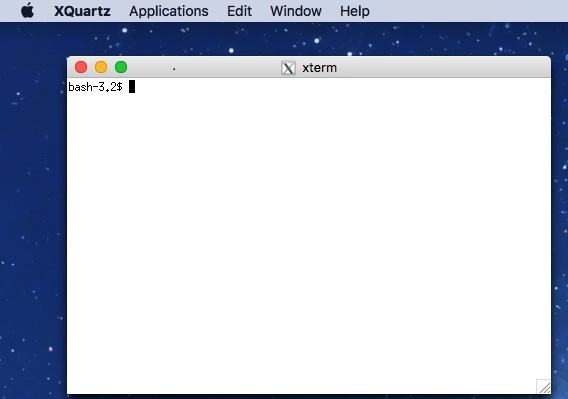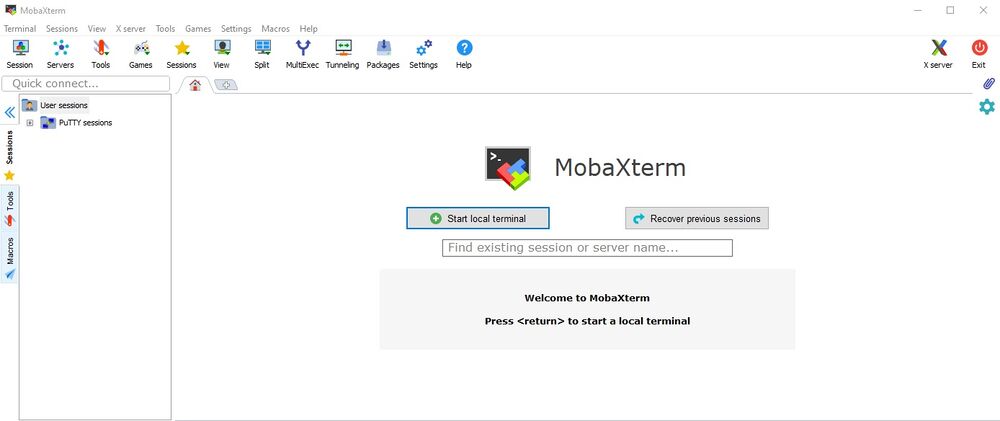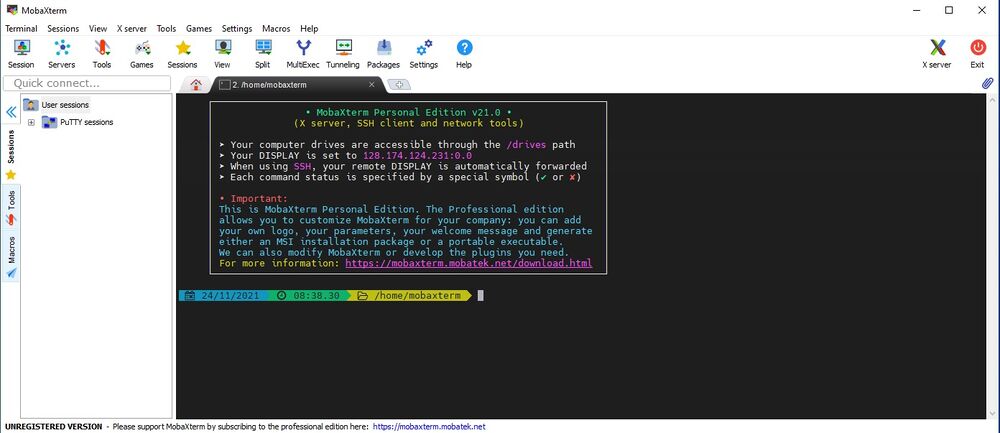Xserver Setup: Difference between revisions
Jump to navigation
Jump to search
| (19 intermediate revisions by the same user not shown) | |||
| Line 1: | Line 1: | ||
__TOC__ | __TOC__ | ||
= | = What is a Xserver = | ||
* Xserver is a method of accessing graphical applications on a remote Linux Machine from your local computer. | |||
* This requires an Xserver program to be installed locally on your computer. | |||
= Mac OS X = | |||
*Download '''XQuartz''' at [http://xquartz.macosforge.org/landing/ http://xquartz.macosforge.org/landing/] | *Download '''XQuartz''' at [http://xquartz.macosforge.org/landing/ http://xquartz.macosforge.org/landing/] | ||
*Install XQuartz and be sure to restart the computer after the installation is done. | *Install XQuartz and be sure to restart the computer after the installation is done. | ||
*Open XQuartz | *Open XQuartz by going to '''Go->Utilities->XQuartz''' | ||
[[File:xquartz.jpg| 900px]] | [[File:xquartz.jpg| 900px]] | ||
* Type in the following to connect to a remote server | * Type in the following to connect to a remote server | ||
<pre>ssh -X | <pre>ssh -X username@destination.server.edu | ||
</pre> | </pre> | ||
*The '''-X''' after "ssh" tells the computer to connect using | *The '''-X''' after "ssh" tells the computer to connect using Xserver | ||
*''' | *'''username''' - is your username | ||
*'''destination.server.edu''' - the server you would like to connect too (example: | *'''destination.server.edu''' - the server you would like to connect too (example: biologin.igb.illinois.edu) | ||
= Windows with MobaXterm = | = Windows with MobaXterm = | ||
*MobaXTerm includes an xserver. This is the easiest method on a windows computer | *MobaXTerm includes an xserver. This is the easiest method on a windows computer | ||
*Download and install MobaXterm | *Download and install MobaXterm from [https://mobaxterm.mobatek.net/ https://mobaxterm.mobatek.net/] | ||
*Open MobaXterm and select '''Start local terminal''' | *Open MobaXterm and select '''Start local terminal''' | ||
[[File:Mobaxterm_xserver_1.jpg| 1000px]] | [[File:Mobaxterm_xserver_1.jpg| 1000px]] | ||
* | *Type in the following to connect to a remote server | ||
<pre>ssh -X | <pre>ssh -X username@destination.server.edu | ||
</pre> | </pre> | ||
*The '''-X''' after "ssh" tells the computer to connect using | *The '''-X''' after "ssh" tells the computer to connect using Xserver | ||
*''' | *'''username''' - is your username | ||
*'''destination.server.edu''' - the server you would like to connect too (example: biologin.igb.illinois.edu) | *'''destination.server.edu''' - the server you would like to connect too (example: biologin.igb.illinois.edu) | ||
[[File:Mobaxterm_xserver_2.jpg| 1000px]] | [[File:Mobaxterm_xserver_2.jpg| 1000px]] | ||
= Linux = | |||
* Most versions of Linux has a Xserver built in. | |||
* Open a terminal window | |||
* Type in the following to connect to a remote server | |||
<pre>ssh -X username@destination.server.edu | |||
</pre> | |||
*The '''-X''' after "ssh" tells the computer to connect using Xserver | |||
*'''username''' - is your username | |||
*'''destination.server.edu''' - the server you would like to connect too (example: biologin.igb.illinois.edu) | |||
= Testing = | = Testing = | ||
* A good test is to run the program | * A good test is to run the program '''xterm'''. Most hosts will have this installed. It will open up a graphical terminal window. | ||
<pre>[username@hostname ~]$ xterm</pre> | <pre>[username@hostname ~]$ xterm</pre> | ||
= References = | |||
*[http://xquartz.macosforge.org/landing/ http://xquartz.macosforge.org/landing/] | |||
*[https://mobaxterm.mobatek.net/ https://mobaxterm.mobatek.net/] | |||
*[https://en.wikipedia.org/wiki/X_Window_System https://en.wikipedia.org/wiki/X_Window_System] | |||
Latest revision as of 15:01, 18 January 2022
What is a Xserver
- Xserver is a method of accessing graphical applications on a remote Linux Machine from your local computer.
- This requires an Xserver program to be installed locally on your computer.
Mac OS X
- Download XQuartz at http://xquartz.macosforge.org/landing/
- Install XQuartz and be sure to restart the computer after the installation is done.
- Open XQuartz by going to Go->Utilities->XQuartz
- Type in the following to connect to a remote server
ssh -X username@destination.server.edu
- The -X after "ssh" tells the computer to connect using Xserver
- username - is your username
- destination.server.edu - the server you would like to connect too (example: biologin.igb.illinois.edu)
Windows with MobaXterm
- MobaXTerm includes an xserver. This is the easiest method on a windows computer
- Download and install MobaXterm from https://mobaxterm.mobatek.net/
- Open MobaXterm and select Start local terminal
- Type in the following to connect to a remote server
ssh -X username@destination.server.edu
- The -X after "ssh" tells the computer to connect using Xserver
- username - is your username
- destination.server.edu - the server you would like to connect too (example: biologin.igb.illinois.edu)
Linux
- Most versions of Linux has a Xserver built in.
- Open a terminal window
- Type in the following to connect to a remote server
ssh -X username@destination.server.edu
- The -X after "ssh" tells the computer to connect using Xserver
- username - is your username
- destination.server.edu - the server you would like to connect too (example: biologin.igb.illinois.edu)
Testing
- A good test is to run the program xterm. Most hosts will have this installed. It will open up a graphical terminal window.
[username@hostname ~]$ xterm


